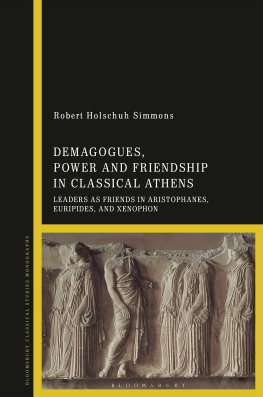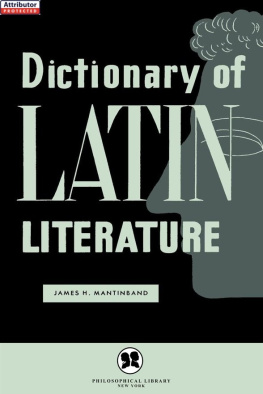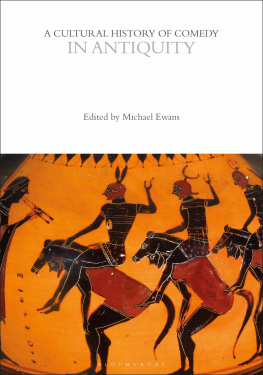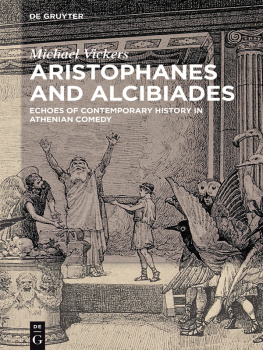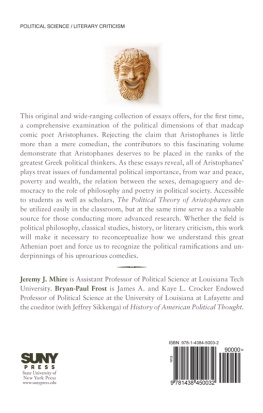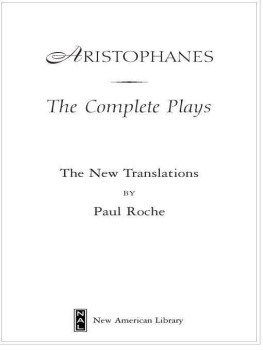
THE BIRDS AND OTHER PLAYS
ADVISORY EDITOR: BETTY RADICE
ARISTOPHANES was born, probably in Athens, c. 448445 BC and died between 386 and 380 BC. Little is known about his life, but there is a portrait of him in Platos Symposium. He was twice prosecuted in the 420s for his outspoken attacks on the prominent politician Cleon, but in 405 he was publicly honoured and crowned for promoting Athenian civic unity in The Frogs. Aristophanes had his first comedy produced when he was about nineteen or twenty, and wrote forty plays in all. The eleven surviving plays of Aristophanes are published in the Penguin Classics series as The Birds and Other Plays, Lysistrata and Other Plays and The Wasps/The Poet and the Women/The Frogs.
DAVID BARRETT studied Classics at Cambridge. After the war he was a lecturer in English at Helsinki University for thirteen years. In 1965 he joined the staff of the Bodleian Library in Oxford, where he specialized in Georgian and Armenian books, retiring from full-time work in 1981. He has translated many works from Finnish, as well as Aristophanes The Wasps, The Poet and the Women and The Frogs for Penguin Classics.
ALAN SOMMERSTEIN has been Professor of Greek at the University of Nottingham since 1988. He has written or edited several books on Ancient Greek language and literature, especially tragic and comic drama, and is currently engaged on a complete edition of the comedies of Aristophanes with translation and commentary. For the Penguin Classics he has also translated Aristophanes Lysistrata, The Acharnians and The Clouds. He is currently editor of Nottingham Classical Literature Studies and joint editor of the international journal Drama.
ARISTOPHANES
The Birds and other plays
The KnightsPeaceWealth The Assemblywomen
Translated with Introductory matter by
DAVID BARRETT
and
ALAN H. SOMMERSTEIN
PENGUIN BOOKS
PENGUIN BOOKS
Published by the Penguin Group
Penguin Books Ltd, 80 Strand, London WC2R 0RL, England
Penguin Putnam Inc., 375 Hudson Street, New York, New York 10014, USA
Penguin Books Australia Ltd, 250 Camberwell Road, Camberwell, Victoria 3124, Australia
Penguin Books Canada Ltd, 10 Alcorn Avenue, Toronto, Ontario, Canada M4V 3B2
Penguin Books India (P) Ltd, 11 Community Centre, Panchsheel Park, New Delhi 110 017, India
Penguin Books (NZ) Ltd, Cnr Rosedale and Airborne Roads, Albany, Auckland, New Zealand
Penguin Books (South Africa) (Pty) Ltd, 24 Sturdee Avenue, Rosebank 2196, South Africa
Penguin Books Ltd, Registered Offices: 80 Strand, London WC2R 0RL, England
www.penguin.com
This translation first published 1978
Reprinted with a Select Bibliography 2003
6
Copyright David Barrett and Alan H. Sommerstein, 1978
All rights reserved
Application for permission to perform these translations should be addressed to the
Society of Authors, 84 Drayton Gardens, London SW10 9SD
Except in the United States of America, this book is sold subject
to the condition that it shall not, by way of trade or otherwise, be lent,
re-sold, hired out, or otherwise circulated without the publishers
prior consent in any form of binding or cover other than that in
which it is published and without a similar condition including this
condition being imposed on the subsequent purchaser
CONTENTS
(Alan H. Sommerstein)
(Alan H. Sommerstein)
(David Barrett)
(translated by Alan H. Sommerstein)
(translated by Alan H. Sommerstein)
(translated by David Barrett)
(translated by David Barrett)
(translated by Alan H. Sommerstein)
About the Author
Aristophanes was active as a writer of comedies at Athens from 427 to about 386 B.C.; forty of his plays were known to ancient scholars, and eleven of these have come down to us: The Acharnians (425), The Knights (424), The Clouds (a partly revised version of a play produced in 423), The Wasps (422), Peace (421), The Birds (414), Lysistrata and The Poet and the Women (Thesmophoriazusae) (411), The Frogs (405), The Assemblywomen (Ecclesiazusae) (probably 391), and Wealth (Plutus) (388).
We know very little of the man except through his work. He does not seem to have taken any direct part in politics: he was probably one of the 500 Councillors for a year in the 390s, but this was an office it was hard to avoid. His comedies, though, were highly political, as comedy was then expected to be, and twice landed him in court (see the Introduction to The Knights). From Platos Symposium, written not long after Aristophanes death, we get an impression of him as a pleasure-loving man, frivolous on the surface but serious underneath a little like some of his heroes.
Comedies were produced once only, competitively, at two annual festivals, before an open-air audience of some 14,000 (of all ages, but predominantly male); thereafter (apart from occasional re-productions at theatres in outlying parts of Attica) they existed only as written texts. The stage directions in this translation are our own; we hope they are a fair approximation to Aristophanes or his producers instructions to actors and chorus, but in many cases anything like certainty is impossible.
With trivial exceptions, Aristophanes comedies are written wholly in verse. This is of three main types: the six-foot iambic metre of ordinary spoken dialogue; various eight-foot metres (iambic, trochaic, anapaestic), delivered in a more strictly rhythmical manner to musical accompaniment, which predominate in two types of scene of capital importance in Aristophanic drama the scene of physical and/or verbal conflict (agon) in which the main issue of the play is often decided, and the address by the chorus to the audience (parabasis); and sung lyrics, performed (with dancing) mainly by the chorus but also by some of the principals. We have followed the pattern of our previous translations, presenting the spoken scenes as prose, the lyrics generally as verse (and in production they certainly ought to be sung), and the recitative passages of the original as one or the other depending on the character of the scene.
A.H.S.
Aristophanes in Antiquity
In Aristophanes time literary criticism was in its infancy; indeed, his own Frogs ranks among its earliest monuments. It is not therefore surprising that we have very little in the way of contemporary critical appraisal of Aristophanes, most of what usually passes under that name being either the small change of comic insult, or later romance about Plato.
From an older contemporary of Aristophanes, the comic poet Cratinus (c. 490c. 420 B.C.), we have one precious word. Cratinus characterized a certain type of poet as a hair-splitting master of niceties, a Euripidaristophanist. In other words, he asserted that Aristophanes resembled Euripides in his concern for verbal precision and dexterity (dexiots, in Aristophanes always a term of praise) in preference to the bolder, rougher strokes typical of those who, like Cratinus himself, had grown up under the spell of Aeschylus. Aristophanes himself was quite aware of this, but he drew a sharp distinction between Euripidean technique and Euripidean thought; or, as he put it in his lost play


